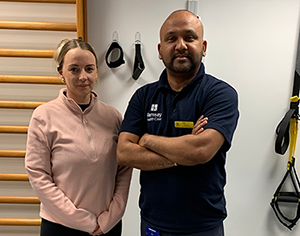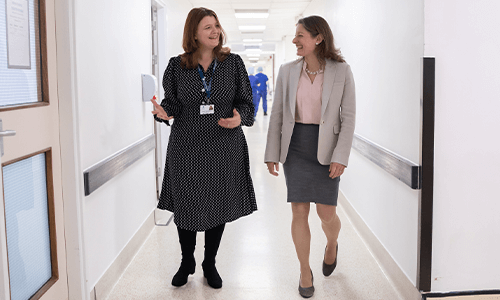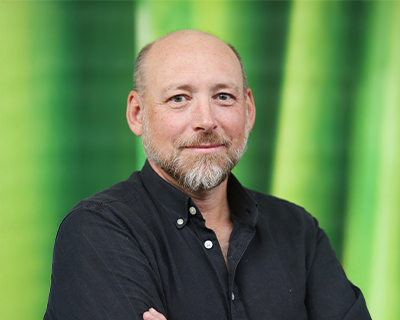The sport you play will influence the sports injury you may get. For example, tennis elbow is often associated with tennis and golf. ACL injuries are common in football. Shoulder injuries often happen in rugby. Runner’s knee pain is frequently suffered by runners.
Injuries are classified as either acute when they happen suddenly, or chronic when they develop over time.
Common sports injuries and their treatment include:
Pulled muscle is one of the most common sports injuries. Hamstrings and groins are frequently pulled muscles.
A hamstring injury is a tear to the tendons or large muscles at the back of your thighs that can happen during sudden lunging, running or jumping. A groin pull is a strain of your inner thigh muscles that generally occurs in sports involving twisting, turning, changing direction, and kicking.
A pulled muscle can vary in its severity. Mild muscle pulls will take a few days to heel. A complete muscle tear can take months to recover and may require physiotherapy treatment and advice on gentle stretching and strengthening exercises.
Ramsay’s team of sports physiotherapists regularly treat patients with hamstring and groin injuries to help them recover. They will assess your injury and develop a personal exercise plan for you.
Ankle sprain – is usually a relatively minor injury. A sprained ankle happens when your foot rolls inward and strains the ligaments on the outside of your ankle. It can occur in sporting activities that involve running, jumping and a quick change of movement.
If you have a more serious ankle sprain, when the swelling and pain has gone down, one of our experienced physiotherapists will be able to advise you on a series of exercises to restore your ankle's range of motion, strength, flexibility and stability. Once recovered, you may be advised to wear tape or an ankle brace for support in the future.
Heel pain – also known as plantar fasciitis, is a common running injury. It occurs when the plantar fascia ligament, that stretches from your heel to your toes and supports the arch of your foot and acts as a shock-absorber, becomes inflamed.
Our team of experts at Ramsay Hospitals can offer stretching physiotherapy exercises, a splint, steroid injections, or shockwave therapy as non-surgical treatment options to treat your heel pain. If you have chronic pain, we may need to operate to release part of the plantar fascia from your heel bone.
Knee injury – is very common and can range from a repetitive strain injury that can heal within a few days, to a serious ACL tear that often requires surgery.
Runner’s knee, also called Patellofemoral syndrome, is a repetitive overuse injury that leads to an inflamed tendon below the kneecap and can cause knee pain whilst running. Physiotherapy is often the first line of treatment for runner’s knee. Our sports physiotherapists at Ramsay Health Care will provide you with an individual strengthening and stretching exercise plan to help you recover safely and quickly.
A serious knee sports injury is an ACL tear. Your ACL is a ligament that stabilises your knee. It can tear if you stop or change direction suddenly, if you land awkwardly from a jump, or you have a collision.
A complete ACL tear will require surgery and physiotherapy to heal. Here at Ramsay Health Care we work in partnership with highly experienced knee surgeons who routinely perform ACL surgery, knee arthroscopy, and knee replacement surgery. They are supported by a team of chartered physiotherapists who will help you to recover to your best level of function.
Tennis elbow – is a repetitive strain injury that affects your forearm, elbow, and wrist. It can cause pain when you bend your wrist backward or turn your palm upwards. A repetitive swing action can cause the muscles and tendons attached to your elbow to become strained, and tears and inflammation can develop near the bony lump (the lateral epicondyle) on the outside of your elbow. It is often seen in tennis players and golfers.
For severe and persistent tennis elbow, physiotherapy is recommended. Physiotherapy treatment will involve massaging and manipulating the affected area and specific exercises to help relieve the pain and stiffness, and improve the range of movement in your arm.
The physiotherapists at Ramsay Health Care will develop a treatment plan using evidence-based practice to help relieve your tennis elbow pain and increase your movement. We offer shock wave therapy for severe tendonitis. We can also perform an arthroscopy of the elbow if required to look inside and cut away an unhealthy portion of the tendon.
Shoulder injury – many sports such as tennis, cricket, basketball and swimming often see shoulder sports injuries due to overuse. A rotator cuff injury can cause the muscles and tendons that surround your shoulder joint to become inflamed, impinged or torn, causing pain, stiffness and weakness.
A dislocated shoulder involves your upper arm popping out of your shoulder joint when you have a heavy fall or sudden impact.
If you have a shoulder injury you should seek medical assistance. Here at Ramsay Health Care we can assess, diagnose and treat your shoulder injury using the latest techniques that are performed by highly experienced surgeons and physiotherapists.
Arthroscopy of the shoulder is keyholes surgery available at Ramsay and is often used for shoulder sports injuries to repair rotator cuff tears, and remove inflamed soft tissues, bone spurs and loose fragments of bone or cartilage.
Bone injury – can occur due to repetitive activity or a heavy impact while playing sport. Bone injuries include stress fractures, shin splints, or a broken ankle, arm, wrist, leg, toe or finger. Bone injuries can be very painful.
Here at Ramsay Health Care our up-to the minute imaging services and the use of arthroscopy can assess and diagnose your bone injury. Our surgeons will determine the best cause of treatment. They have a comprehensive treatment toolkit including cast immobilisation, resetting the broken bone, external fixation, and open reduction and internal fixation. Our physiotherapists will give advice on exercises to help restore normal muscle strength, joint motion, and flexibility. Arthroscopy of the wrist, is commonly performed to realign and stabilise wrist fractures.



